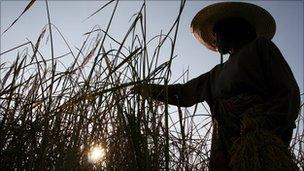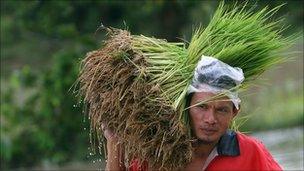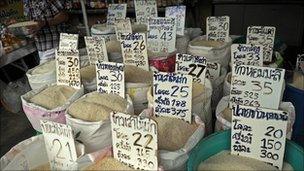Thailand's new rice policy 'may threaten exports'
- Published

Thailand is the world's largest rice exporter
Thailand, the world's biggest rice exporter, introduces a new pricing scheme on Friday.
The government says it will boost the incomes of farmers and help alleviate rural poverty.
But critics fear the new policy will skew the market at home and, potentially, globally as well.
The government is offering to buy paddy, or unmilled, rice at 15,000 Thai baht ($482.6; £312) per metric tonne, which is a 50% premium on the current market rate.
However, private exporters say the high price will place them at a disadvantage, putting Thailand's dominant global position in jeopardy.
"Private millers, private traders, private exporters will go out of business if the government keeps one price way above the market price for too long," complains Vichai Sripraset, President of Riceland International.
Fixed prices, Mr Vichai says, are too inflexible.
"When the [fixed] price is too low, the producer, the farmer, cannot survive. When it's too high, the consumer cannot stand it. Market forces are better at adjusting to changing circumstances."
Radical change
The previous government, which lost power in July's election, introduced its own policy for the rice industry - a subsidy programme that compensated farmers if market prices fell below a fixed benchmark.
Under the new system, however, farmers will be encouraged to use rice as collateral against loans from the state-owned bank for agriculture.

Under the new scheme, farmers are not guaranteed a minimum income if their crop underperforms
If prices on the open market are higher than the government offer, farmers are free to sell privately.
But if the market price falls, they will have the option of selling at the government-fixed price.
One of the fundamental differences between the two schemes is that under the old system, farmers were guaranteed a minimum income based on the amount of rice they normally produced, even if their crop underperformed.
With the introduction of the new government programme, farmers will need harvested paddy rice to sell before they get any money.
Global impact
Ammar Siamwalla, senior economist at the Thailand Development Research Institute, says the short term impact on the global market will depend on how much of the government-bought rice it decides to store and how much it exports.
"If they put it in storage, it means that much rice is taken away from the world market which we used to export [to], and I expect a substantial amount will be put in storage.
"That will effect international prices because there will be less rice in world markets."
If the government does decide to store large quantities of rice, it could be good news for owners of private warehouses.
But it would also be an additional cost to the Thai taxpayer.
It also raises fears that the government might be tempted to dump large quantities of rice on the market as the price moves up, and before the rice spoils, forcing a sudden correction.
An alternative scenario would see the Thai authorities trying to control supply by discouraging increases in production.
But that could hurt the very farmers the new policy is designed to help.
The government argues that any shortfall in production will be offset by the higher price.
Thailand currently supplies about a third of global rice exports, which means decisions made in Bangkok can have far reaching implications.
The US Famine Early Warning Systems Network says a recent spike in global prices can, in part, be explained by the market anticipating the Thai government's new scheme.
Other exporters, the FEWSN says, are poised to take advantage.
India has just lifted an export ban on rice other than basmati and is thought to have a surplus of 15 million metric tonnes ready for market (another 10 million is being held back for food security).

Critics say the new policy will skew the market at home and globally
Mr Ammar, a prominent critic of the new scheme, is less worried about the quantity of rice Thailand exports than he is about reputation.
"Thai rice in the marketplace is known for its high quality. Only the private sector can make distinctions and pay everybody along the supply chain according to quality. We have a dominant share in that [high quality rice market] and we're going to lose it."
The government is determined to press ahead, describing the new rice pricing scheme as one of its most important policies.
The ultimate test will be whether rice farmers like the new arrangement.
An unscientific survey of a handful of farmers contacted by the BBC suggested a good deal of confusion, along with a feeling that the new price plan is coming into effect too late to be of benefit.
"We have lots of debts so we have to sell the rice as soon as it's harvested, even though we know that if we wait we can make more money under the new scheme," said one.
Another added forlornly: "With so many rice fields flooded right now, farmers are not going to have rice to sell."
- Published5 October 2011
- Published11 July 2011
- Published9 February 2011